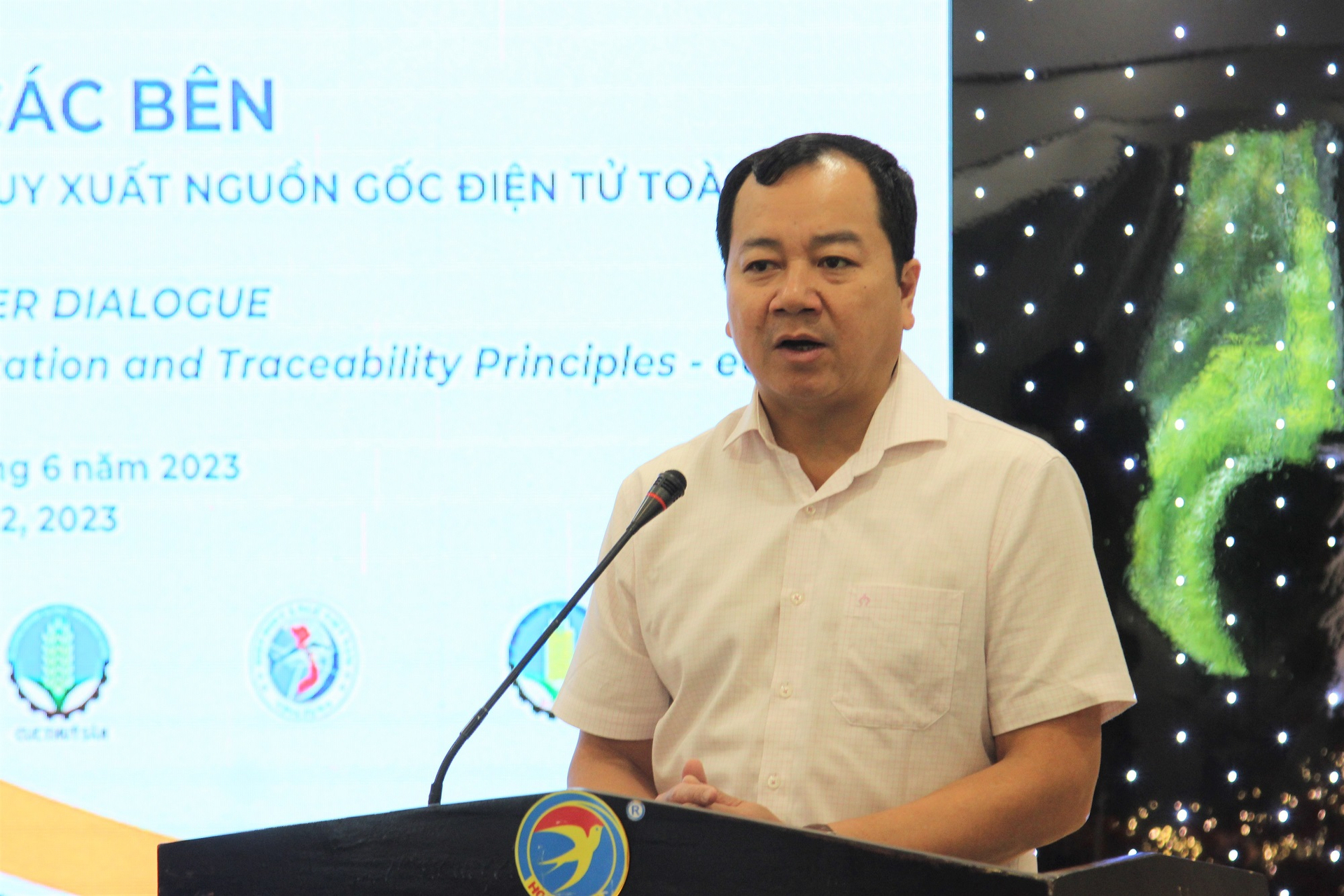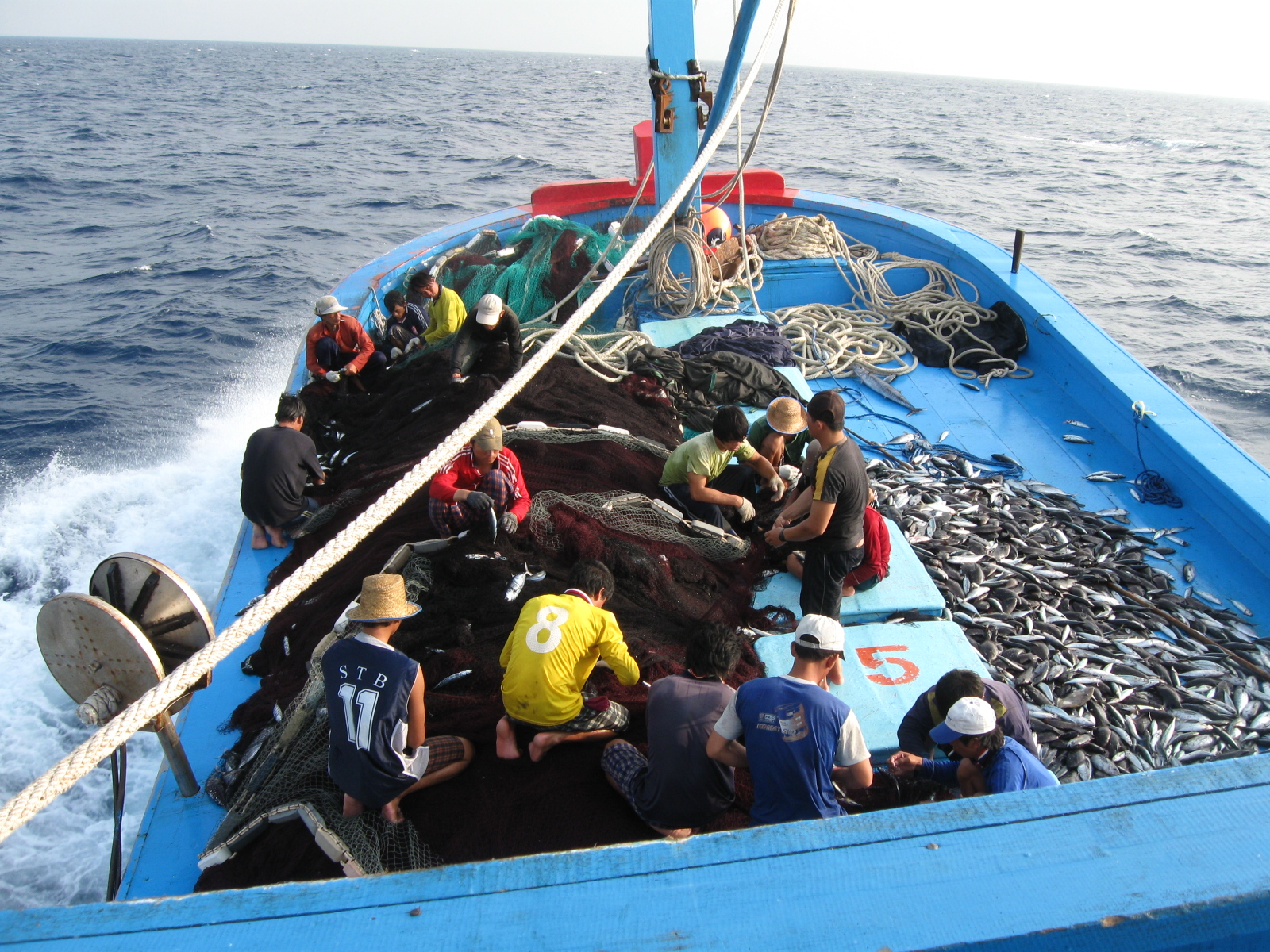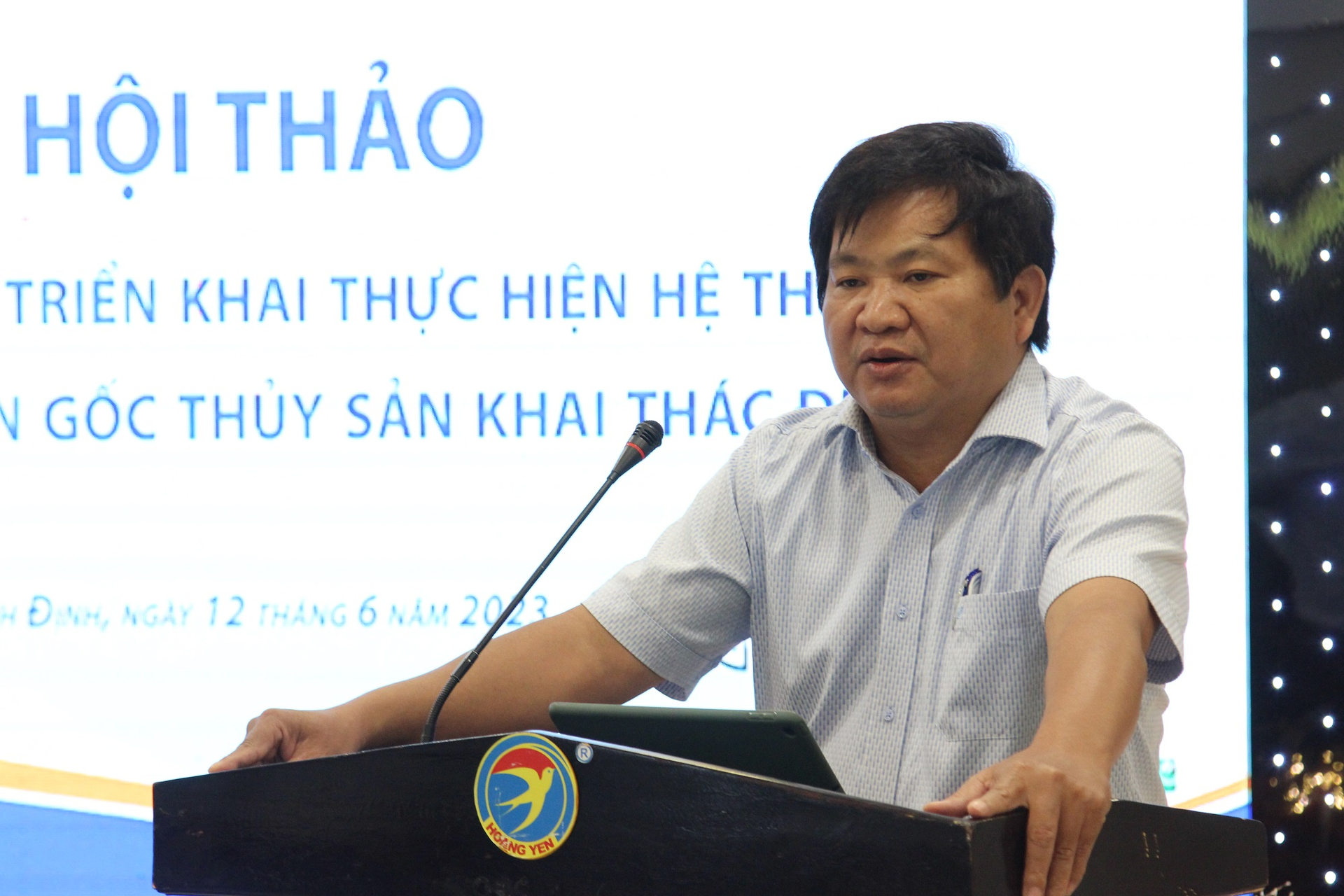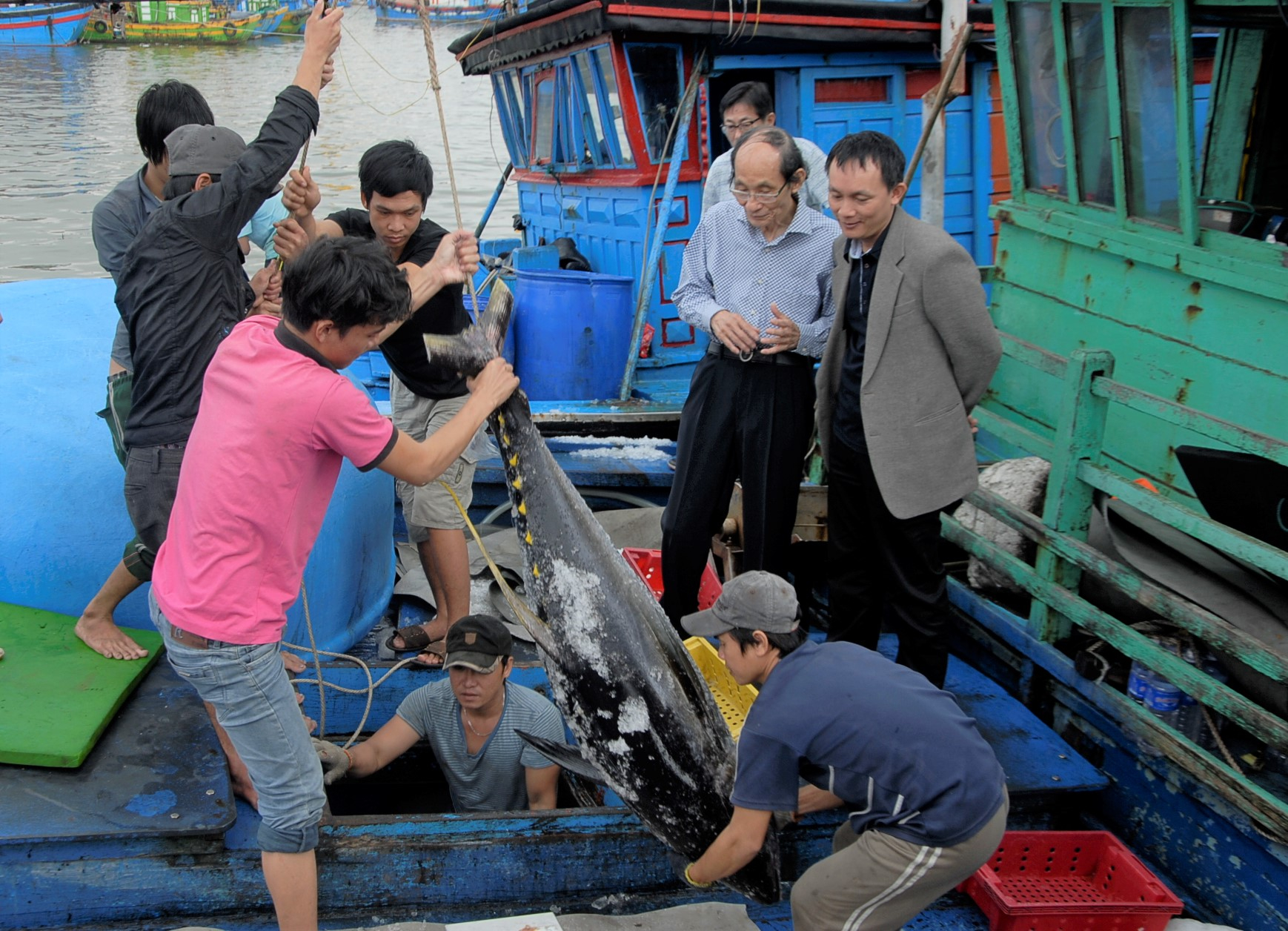May 24, 2025 | 03:03 GMT +7
May 24, 2025 | 03:03 GMT +7
Hotline: 0913.378.918
May 24, 2025 | 03:03 GMT +7
Hotline: 0913.378.918
The Department of Fisheries under the Ministry of Agriculture and Rural Development collaborated with Centre for Marinelife Conservation and Community Development and Binh Dinh Department of Agriculture and Rural Development to hold a workshop on June 12. The workshop focused on solutions to deploy a seafood traceability software.

Mr. Tran Dinh Luan, Director of the Department of Fisheries, at the workshop. Photo: V.D.T.
According to Mr. Tran Dinh Luan, the Ministry of Agriculture and Rural Development provided funded the Department of Fisheries to build a phase I seafood traceability software in 2017. The Ministry of Agriculture and Rural Development continued to support governmental agencies financially throughout 2019 and 2020 in order to refine this software in accordance with the features of Vietnam's fisheries sector.
Stakeholders in the deployment of the seafood traceability software include fishermen, fishing ports, companies processing seafood for export, local and central authorities. The software will be deployed in six stages, including: Manage exporting vessels and record initial data on ships and crews; record fishing volume through electronic devices; manage vessels entering ports, update on fishing volume; supervise output at ports, issue loading and unloading receipt for trading at port; issue certificate of origin for raw materials used in processing plants.
“The fishery sector has made great efforts to trace the origin of fishing vessels arriving at Vietnam's fishing ports and seafood processing factories. However, the implementation process has presented significant difficulties for the sector. That is the rationale behind the creation of this software", Mr. Luan explained.
According to Mr. Luan, the seafood traceability software system was developed after consulting with specialized departments. The software has been tested on fishing vessels to relatively positive results. The software ensures the accuracy of seafood origin. Moreover, fishermen may use less manpower when registering for vessels entering and leaving ports.

A Binh Dinh province's fishing vessel operating at sea. Photo: V.D.T.
Most notably, the seafood traceability software is integrated into the port's management system. Accordingly, when a fishing vessel arrives at the port, relevant departments may retrieve information regarding its fishing yield and proceed with the certification process with local Sub-Departments of Fisheries. As a result, the process of seafood harvest is greatly streamlined from the port to the processing plant, leading to a significant cut in manpower while maintaining the accuracy in seafood traceability.
According to Mr. Luan, Binh Dinh province currently accounts for over 50% of the total number of tuna fishing vessels in the country. The province also accounts for over 50% of the national tuna production, with the majority of caught fish being bigeye yellowfin tuna. Additionally, Binh Dinh is a pioneer in utilizing electronic diaries on offshore fishing vessels to ensure the accuracy and transparency of seafood traceability.
The pilot implementation of electronic fishing log in Binh Dinh has resolved some of the limitations brought on by their physical counterpart. With the help of electronic logs, vessel owners can avoid depending solely on their memories, which may compromise the accuracy of seafood traceability.
“The electronic fishing logs can help digitize all documents on traceability of caught seafood, with accurate and transparent information so that the export route is unobstructed. On the other hand, it minimizes the waiting time for administrative procedures, allows for feedback from importers, and enhances the position of Vietnamese seafood in the global market", emphasized Mr. Tran Dinh Luan.
According to Mr. Tran Van Phuc, Director of Binh Dinh Department of Agriculture and Rural Development in addition to urgent solutions to combat illegal, unreported and unregulated (IUU) fishing in recent years, Binh Dinh province has applied experimental softwares to trace the origin of caught seafood.

Mr. Tran Van Phuc, Director of Binh Dinh Department of Agriculture and Rural Development, at the workshop. Photo: V.D.T.
According to him, the electronic fishing log initiative has made remarkable progress after over 5 years in practice. The paper-based fishing logs in the past have revealed several limitations, all of which have been resolved with the application of electronic fishing logs.
“The application of electronic fishing logs has helped vessel owners to fully and accurately record their catches, with the addition of precise fishing coordinates. Manual logging can be accurate in terms of yield, but the coordinates can be inaccurate when compared with the vessel monitoring system. As a result, when the vessel returns to shore, the certification procedures can be challenging due to these inaccuracies", said Mr. Phuc.
With the support from the Centre for Marinelife Conservation and Community Development, Binh Dinh province has been a pioneer in the utilization of electronic fishing logs since 2020. Binh Dinh Provincial People's Committee deployed 100 electronic logging devices for fishing vessels in the area in 2023.

Binh Dinh province is piloting the application of electronic fishing logs on tuna fishing vessels. Photo: V.D.T.
“We aim to deploy electronic fishing logs on ocean tuna fishing vessels. Binh Dinh currently has around 1,500 vessels in this profession. The electronic fishing log will help resolve concerns regarding inaccurate recording, output monitoring, confirmation and certification of seafood origin. Most importantly, this type of electronic fishing log meets the anti-IUU fishing requirements as posed by the European Commission”, added Mr. Tran Van Phuc.
Mr. Tran Dinh Luan added: "The application of the electronic seafood traceability system will face varous problems from the trial stage to widespread deployment. The local governments, fishing vessel owners and fishing unions will help facilitate the widespread deployment. This is the foundation for the functional sector to refine this management system in the immediate future.
The results of the pilot electronic fishing log in Binh Dinh will be replicated in other provinces across Vietnam, so that caught seafood will have a transparent origin for export. We are currently discussing with vessel monitoring equipment suppliers to allow for connection between their devices and the traceability software to ensure the accuracy of catch and coordinates”.
Translated by Nguyen Hai Long

(VAN) The People's Committee of Tra Vinh province has approved an adjustment to the investment policy for the Green Hydrogen Plant project, increasing its area to approximately 52.76 hectares.
![Reducing emissions from rice fields: [2] Farmers’ commitment to the soil](https://t.ex-cdn.com/nongnghiepmoitruong.vn/608w/files/news/2025/05/05/dsc08881jpg-nongnghiep-140632.jpg)
(VAN) Clean rice cultivation model in Thuong Tan commune, Bac Tan Uyen district, is assisting local residents in achieving sustainable agriculture by substantially reducing costs, increasing productivity, and protecting the environment.

(VAN) At the conference to disseminate Resolution No. 68, AgriS introduced its digital agricultural ecosystem and reaffirmed its commitment to accompanying the Government in promoting private sector development and sustainable agriculture.

(VAN) 'Blue Ocean - Blue Foods' initiative is designed to restore marine ecosystems and establish sustainable livelihoods for local communities by cultivating a minimum of 1,000 hectares of cottonii seaweed in the first three years.
/2025/05/21/4642-3-112707_603.jpg)
(VAN) The V-SCOPE project has made direct contributions to three out of six pillars of the Comprehensive Strategic Partnership between Vietnam and Australia.

(VAN) Facing the threat of rabies spreading to the community, Gia Lai province urgently carries out measures to vaccinate dogs and cats on a large scale.

(VAN) Disease-free livestock farming not only protects livestock herds but also stabilizes production and livelihoods for many farmers in Tuyen Quang.